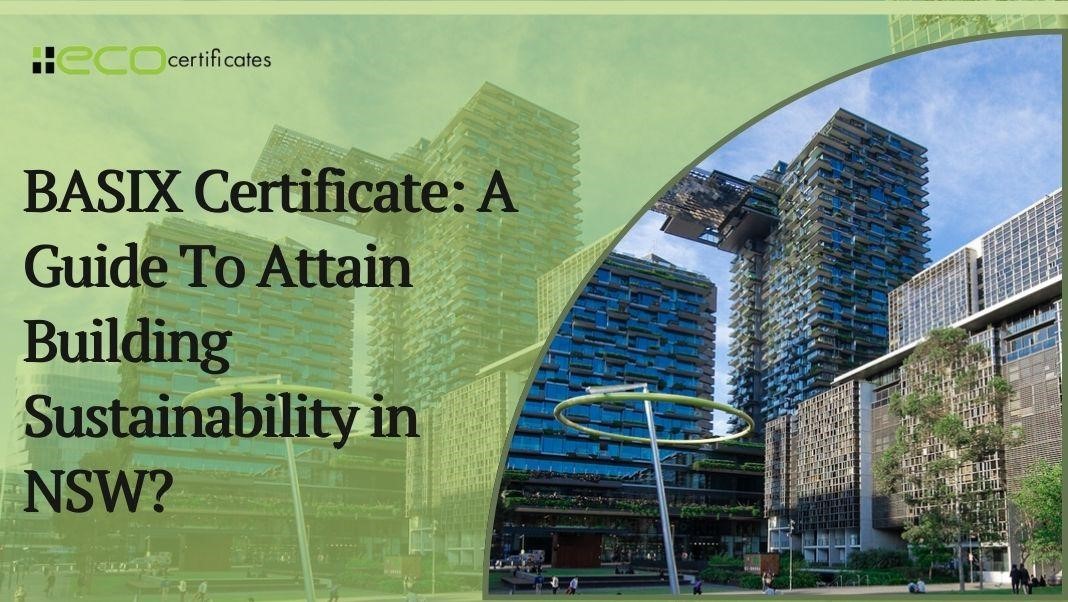Have you recently undertaken a home remodeling project? Or are you developing residential housing in NSW? If that’s true, you may already be familiar with the phrases the BASIX report and certificate.
In fact, obtaining a BASIX certificate is essential for getting council approval to construct a residential property in NSW.
But what is BASIX? Why is it so important? Most importantly, how do you obtain a BASIX certificate for your residential development? We’ll discuss everything related to BASIX in this blog.
So, let’s begin with the basics of BASIX!
What is a BASIX Certificate?
In NSW, the BASIX Certificate (Building Sustainability Index) is a mandatory element in the planning process.
You’ll need it to obtain a development application. Just like NABERS rating for office it also aims to improve the sustainability of your building.
Unlike NABERS, BASIX calculation doesn’t involve a star rating. Instead, the certificate verifies that your residential project meets the BASIX sustainability requirements.
This certificate shows that your home is built to efficiently use fewer resources. These include potable water and energy.
Use the BASIX assessment tool to generate a BASIX report. That’s an initial and informal document. You can use this report to check the information and make any adjustments. After that, you’ll get your BASIX certificate.
In the online tool, you’ll need to input the necessary data. These data should highlight that your building meets the water target, energy and thermal comfort targets. Only after your building meets the water, energy and thermal comfort targets will you obtain a BASIX certificate.
When will you need a BASIX Certificate?
All new residential dwellings under NSW jurisdiction require a BASIX certificate. Here’s a more detailed segmentation of the residential structures that require BASIX report and certification:
- New residential houses and dwelling
- Semi-detached homes
- Cottages
- Multi-dwellings
- Secondary dwellings
- Dual-occupancy dwellings
- Townhouses
- Villas
- Granny flats
Additionally, A BASIX Certificate is necessary for the following residential renovations:
- the residential upgrade is valued at $50,000 or greater
- the renovation involves a pool/spa installation having a volume of more than 40,000 litres
Increase to BASIX standards: What Should You Know?
To meet the zero emissions plan and further improve the sustainability of residential dwelling the NSW Government increased the BASIX standards on 1 October 2023.
Increased standards will help create a more comfortable home. These homes will maintain year-round comfort with less dependency on heating and cooling technology.
The increased sustainability standards for new residential development include the following:
- Nationwide House Energy Rating Scheme (NatHERS): Raising the thermal efficiency requirement from an average of 5.5–6 stars to 7 stars.
- Decreasing greenhouse gas emissions: A reduction of 7-11% may be applicable depending on the location and the type of residential development.
To avoid repetitive alternation on BASIX certificates, you are recommended to get a BASIX report first.
According to the BASIX data, an average home complying with the increased BASIX standards will:
- Reduce energy expenses by $1,070 annually
- Save an additional $678 per year after paying off the mortgage at an annual interest rate of 5.94%.
However, there are some exceptions. Residential dwellings built in climate zones 9, 10 and 11 and residential apartment buildings up to 5 storeys don’t need to comply with the increased BASIX requirement.
How much does a BASIX Certificate Cost?
The size and design complexity of the residential building overall cost to obtain a BASIX certificate. Consult with a building consultant.
They’ll share a quote with you after reviewing your project design. They’ll first share a BASIX report with you before getting a certificate to save any unnecessary costs.
Here’s a breakdown of the BASIX certificate cost (this is just an estimate):
- Single Storey New homes start from $240.00
- For Double Storey New Homes, certification begin at $320.00
- Typical costs for Renovations & Alterations start at $180.00.
Next are the Government charges:
- The NSW Department of Planning & Infrastructure mandates a $50.00 fee for new homes.
- The NSW Department of Planning & Infrastructure requires a payment of $25.00 for any changes or enhancements made.
- There is an extra $30.00 charge for the NatHERS Certificate on new homes built using the Simulation Method.
The prices listed above do not incorporate GST. Also, you’ll need to consider the BASIX consultation fee.
Tips To Meet Basix Requirements In Your Home Renovation
Here are a few practical tips you can implement to obtain a BASIX certificate:
- Initiate strategic residential building planning. Ensure that your plan focuses on energy efficiency and water conservation measures.
- Choose construction materials that have minimal impact on the environment. These may include recycled or locally sourced materials.
- Invest in excellent insulation to maintain thermal comfort without straining the heating and cooling systems.
- Get energy-efficient appliances and lighting. Energy-efficient fixture helps to minimise energy usage. Consequently you’ll enjoy lower long-term operational expenses.
- Consider including renewable energy sources. For example, including solar panels in your renovation project.
- Install fixtures that save water to decrease water wastage. Examples include water-efficient faucets, showerheads, and toilets.
- Install a rainwater harvesting system. This’ll help you utilize rainwater for various activities other than drinking.
- Create smart outdoor areas by using plants that are resistant to drought and implementing irrigation systems that are efficient to reduce water consumption.
- Make sure your renovation plan preferences natural cross-ventilation to uphold comfortable indoor temperatures.
- Get efficient shading. Integrate solutions such as overhangs and awnings to decrease the impact of direct sunlight on heat levels.
- Think about selecting windows that have low-emissivity coatings to improve insulation and overall comfort.
Just like NABERS rating BASIX compliance and certification in NSW sets the standard for eco-friendly building practices. BASIX supports environmentally responsible residential development.
What Is The BASIX Certification Process?
BASIX compliance involves assessing the designs and details of a building. This assessment determines if the proposed design fulfils the essential sustainability criteria. The typical process for certification is as outlined below:
- Submission: Plans should be submitted to the appropriate authorities, usually through online platforms, outlining how the structure will comply with BASIX specifications.
- Evaluation: Skilled evaluators review the papers to ascertain if they comply with the energy, water, and thermal comfort regulations.
- Certification: If the designs are approved, the building is issued a BASIX certificate as evidence of meeting requirements.
- Construction and Examination: Inspectors may visit the site during the construction phase to verify the building’s compliance with the BASIX certificate.
Occupancy is allowed once the building is completed and meets BASIX requirements, at which point it can be used.
Wrapping Up
Global warming is an alarming concern. Therefore, the Australian Government has implemented measures to decrease the country’s carbon footprint. BASIX is one such sustainability requirement. It aims to improve the energy and water efficiency of residential buildings.
To ensure your residential project obtains the BASIX certificate smoothly, consult a building professional.










